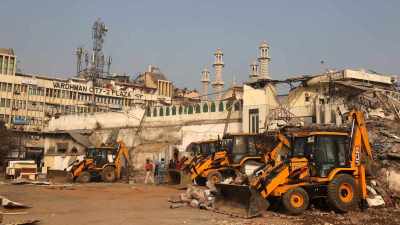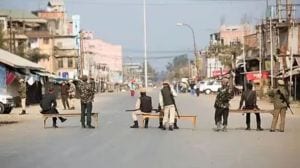Demolition myths
It was a nerve-racking selection process that culminated in Vilasrao Deshmukh becoming chief minister of Maharashtra again. Intrigue and fac...

It was a nerve-racking selection process that culminated in Vilasrao Deshmukh becoming chief minister of Maharashtra again. Intrigue and factional jockeying carried well into the evening hours of the day his name was announced as leader of the Congress-NCP government. But only a few months into his second innings, Deshmukh seems ready to play some decisive strokes. The unprecedented scale of the demolition drive initiated under his government8217;s watch in Mumbai is certainly one. Deshmukh cannot but be aware of the dangers he courts. These will emanate, indeed they already have, not just from his opponents. They will come, also, and especially from those within his own party whose political ambitions are in danger of being bulldozed alongwith the illegal slum sprawl. Deshmukh must face not just the legitimate claims of rehabilitation by those who have been rendered homeless by law, but also the motivated clamour made in bad faith by those who have profited from the dark areas in one of India8217;s wealthiest cities. Deshmukh must stay the course.
Mumbai has always been a magnet for those seeking employment and the spread of places like Dharavi is certainly testimony to the failure of the state in the early decades after Independence to acknowledge this reality and plan for it. Today, an estimated 62 per cent of Mumbai lives in its slums. These are insanitary urban wastelands where people huddle in ill-lit shabby structures lacking in all grace and amenity. They are the most vulnerable, most ill-serviced sections of the urban population. They exist at the mercy of slumlords who exploit them in collusion with the corrupt staff of the BMC, collector8217;s office and police department. This cannot be the way of life anyone must fight to preserve.
The Deshmukh government must now guard against the inevitable slide-back, through re-encroachment. It must make all efforts to rehabilitate those who have nowhere to go. At the same time, the land that has now been freed must be utilised for the infrastructure projects that are so necessary to keep India8217;s industrial heartland alive and humming and, indeed, which are the best hope of integrating the city8217;s most profoundly disadvantaged groups into Mumbai8217;s economy. For many years now, the Airport Authority of India has complained about the uncomfortable proximity of the slums to the Chhattrapati Shivaji International airport, for instance. In the days to come, the Deshmukh government must ensure that the grand plan to revamp one of India8217;s richest but also shabbiest cities proceeds apace. It must retain its firmness of purpose even as it must not abdicate its responsibility to be compassionate.
- 01
- 02
- 03
- 04
- 05






























